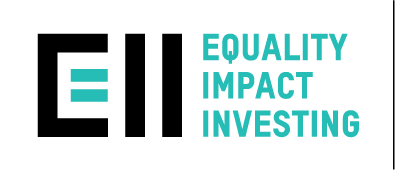Impact management and equality impact investing
By Dr Jess Daggers
EIIP is seeking to bridge two fields of practice: the field of impact investing, and the field of equality and human rights. Both of these fields have developed their own measurement practices and frameworks.
For impact investors, the challenge is to find a way to define and measure the impact created by the companies being invested in. Often referred to as ‘impact measurement and management’ (IMM), the focus is on finding ways to gather data about impact that helps investors make decisions at various stages of the investment journey. Over the past five years the impact investing community has shared in a real sense of progress. Several initiatives, such as the Impact Management Project (IMP)’s five dimensions of impact and investor classification, and the International Finance Corporation (IFC)’s operating principles for impact, have gained widespread recognition and act as common reference points. The SDGs are now referred to across the impact investing space as a common way of understanding the change that needs to take place. The degree of consolidation should not be overemphasised, however, as there continues to be wide diversity in how IMM is implemented across the impact investing market.
In the field of equality and human rights, measurement efforts have focused on accurately capturing the nature and extent of inequality in different settings. In the UK, both the Equalities and Human Rights Commission and the LSE, in partnership with Oxfam, have published frameworks which measure inequalities. These frameworks are a rich source of detailed insight into how inequality can be broken down across multiple dimensions, and the data collected using these frameworks improves our collective understanding of inequality in the UK and globally.
EIIP’s work will explore the interaction between IMM and EHR frameworks at two levels.
At the first level, we are asking: how can the progress made in measuring inequality be transferred into the impact investing space? Can the measures and techniques used within EHR be integrated into IMM frameworks? Big Society Capital has already pioneered an approach that explicitly and systematically considers how indicators of inequality can be integrated into their outcomes matrix. There is plenty more work to be done in exploring how insight from the work done in EHR frameworks can be picked up and used by investors.
At the second level, we are asking: can IMM frameworks be designed in a way that helps to address inequality? Conversely, are there ways in which IMM could actually worsen inequality?
Most of us are now familiar with the idea of ‘impact washing’ – the risk that investors start using the ‘impact’ label while continuing with business as usual. A potentially far greater risk is ‘unintentional impact washing’ – the risk that investors think, based on their IMM frameworks, that they are having a positive impact, when in reality they are not, and in fact are potentially making things worse for some groups. This is particularly concerning if the misunderstanding grows not out of doing IMM badly, but out of doing it well. As IMM develops, there are inevitable compromises made in the attempt to translate complex, multi-dimensional social change – ‘impact’ – into a consistent, predictable format that is amenable to investor decision-making. Part of EIIP’s work in this area is to ask questions over how far the compromises made in developing standard approaches to IMM work in favour of investors, and to the disadvantage of communities who are already disadvantaged.
We seek to build on the work of the European Venture Philanthropy Association (EVPA) in making a distinction between investing for impact and investing with impact. The EVPA states that investors for impact are more likely to use bespoke systems, and to work with investees and communities to understand their impact, whereas investors with impact are more likely to rely on standardised indicators. Building on growing awareness that the way we know things is intricately caught up in unequal power relations, seen in initiatives such as the Human Learning Systems initiative, and the Centre for Knowledge Equity, we will build on EVPA’s work to explore whether IMM is helping or hindering the reduction of inequality.
About Dr Jess Daggers
Dr Jess Daggers brings over a decade of experience of impact measurement to EIIP, based on work across the academic and practitioner domains. Her consulting work ranges across sectors, with projects working to measure the impact of journalism, entrepreneurship education, and affordable credit. Increasingly her focus is on the strategies that organisational leadership can take towards measurement in a crowded landscape of measurement possibilities and demands. Jess continues to study and write on the topic of impact measurement, building on her PhD thesis, which examined the growth of the social investment market in the UK. Jess is an Associate Research Fellow at Birkbeck College, University of London, and a Fellow of the Centre for the Understanding of Sustainable Prosperity (CUSP).
